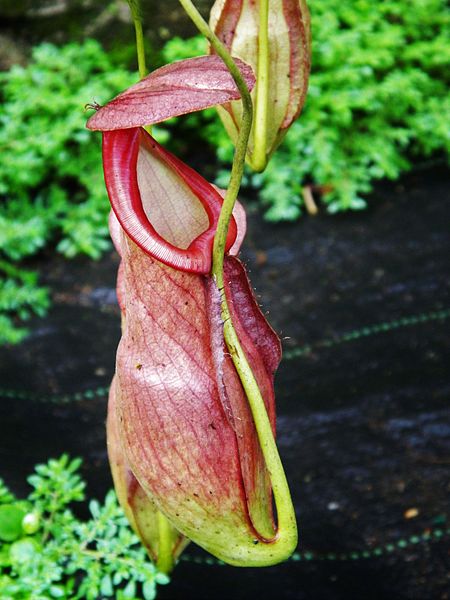Nepenthes mirabilis, or the common swamp pitcher-plant and tropical pitcher plant, is a carnivorous plant species. By far the most widespread of all Nepenthes, its range covers continental Southeast Asia and all major islands of the Malay Archipelago, stretching from China in the north to Australia in the south. The species exhibits great variability throughout its range. One of the more notable varieties, N. mirabilis var. echinostoma, is endemic to Brunei and Sarawak and possesses an extremely wide peristome.
Nepenthes mirabilis
An upper pitcher of N. mirabilis var. echinostoma
A lower pitcher of a cultivated N. mirabilis var. globosa
N. ampullaria × N. mirabilis
Nepenthes is a genus of carnivorous plants, also known as tropical pitcher plants, or monkey cups, in the monotypic family Nepenthaceae. The genus includes about 170 species, and numerous natural and many cultivated hybrids. They are mostly liana-forming plants of the Old World tropics, ranging from South China, Indonesia, Malaysia, and the Philippines; westward to Madagascar and the Seychelles (one); southward to Australia (four) and New Caledonia (one); and northward to India (one) and Sri Lanka (one). The greatest diversity occurs on Borneo, Sumatra, and the Philippines, with many endemic species. Many are plants of hot, humid, lowland areas, but the majority are tropical montane plants, receiving warm days but cool to cold, humid nights year round. A few are considered tropical alpine, with cool days and nights near freezing. The name "monkey cups" refers to the fact that monkeys were once thought to drink rainwater from the pitchers.
Nepenthes
Nepenthes mirabilis at the Periyar Tiger Reserve, in Southern Western Ghats of India
Nepenthes from Carolus Linnaeus's Species Plantarum of 1753
A drowned lizard found in a freshly opened pitcher of N. rajah








